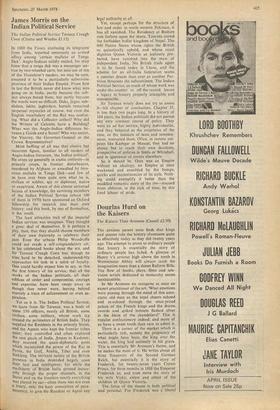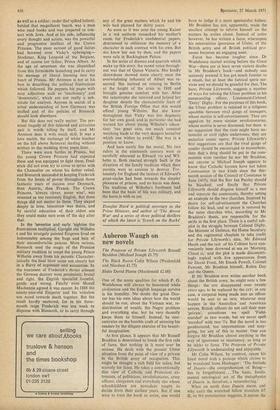Douglas Hurd on the Kaisers
The Kaisers Theo Aronson (Cassell £2.50)
The anxious parent soon finds that kings and queens rule the history classroom quite as effectively today as they did twenty years ago. The attempt to prove to ordinary people that history is essentially the story of ordinary people has failed. A glimpse of Henry v's armour high above the tomb in Westminster Abbey will always catch the imagination more than a dozen Reform Bills. The flow of books, plays, films and tele- vision serials dedicated to monarchy seems inexhaustible.
In Mr Aronson we recognise at once an expert practitioner of the art. 'What emotions were passing through the mind of this auto- cratic old man as the loyal cheers echoed and re-echoed through the once-proud palace of the French kings and the drawn ,swords and spiked helmets flashed silver in the blaze of the chandeliers?' This is royalist confectionery indeed; and more of us have a sweet tooth than care to admit it.
There is a corner of the market which is particularly rich, namely the poignancy of what might have been, the king over the water, the king laid untimely in his grave. This is essentially Mr Aronson's theme, and he makes the most of it. He writes about all three Emperors of the Second German Reich, but essentially it is the story of Frederick, for twenty-seven years Crown Prince, for three months in 1888 the Emperor Frederick III. and even morp the story of his wife Vicky, eldest and ablest of the children of Queen Victoria.
The force of the theme is both political and personal. For Frederick was a liberal as well as a soldier; under that spiked helmet, behind that magnificent beard, was a man who read books and was prepared to con- sort with Jews. And at his side, influencing every thought and action, was the powerful and progressive intellect of the Crown Princess. The most earnest of good fairies had hovered over Vicky's upbringing- Stockmar, King Leopold of the Belgians, and of course her father, Prince Albert. At the age of seventeen she was dispatched from this formidable launching pad to carry the message of liberal learning into the heart of Prussia. Mr Aronson is not at his best in describing the political frustrations which followed. He peppers his pages with easy adjectives such as 'reactionary' and 'democratic', which are not really a sub- stitute for analysis. Anyone in search of a sober understanding of how Germany was unified and of the policies of Bismarck should look elsewhere.
But this does not really matter. The per- sonal tragedy of this talented and attractive pair is worth telling by itself, and Mr Aronson does it with much skill. It was a love match, the exchange of white heather on the hill above Balmoral leading without mishap to the wedding three years later.
There were soon battles in Prussia, but the young Crown Princess had expected these and was equipped to fight them. Fred- erick did not even try to come to terms with the Chancellor on whom his father relied, and Bismarck succeeded in keeping Frederick from the levers of power throughout those fantastic years of success over Denmark, then Austria, then France. The Crown Princess, 'always clever, never wise', was resented as too resolutely English. But these things did not matter to them. They stayed deeply in love, tomorrow was theirs, and by careful education of their eldest son they could make sure even of the day after that.
In the 'seventies and early 'eighties the frustrations multiplied. Upright old Wilhelm and his strangely painted Empress lived on indomitably among the bugs and bats of their uncomfortable palaces. More serious, Bismarck used the magic of the Prussian military tradition to tempt the young Prince Wilhelm away from his parents. Character- istically the final blow came not cleanly but in a flurry of argument and accusation. In the treatment of Frederick's throat ailment the German doctors were pessimistic, brutal and right, the English specialist hopeful, gentle and wrong. Finally even More11 Mackenzie agreed it was cancer. In 1888 the ninety-year-old Emperor and his, voiceless son raced towards death together. But the result hardly mattered, for in his three- month reign Frederick was too weak to dispense with Bismarck, or to carry through any of the great matters which he and his wife had planned for thirty years.
As soon as it was over the young Kaiser in a red uniform ransacked his mother's room for Frederick's confidential papers, determined to obliterate the memory of a character in such contrast with his own. But she knew her son by then, and the papers were safe in Buckingham Palace.
In the series of dramas and quarrels which make up this story, the sanest voice through- out was that of Queen Victoria. Her kindly shrewdness showed more clearly once the overwhelming influence of Albert was re- moved. She insisted on coming to Berlin at the height of the crisis in 1888 and brought genuine comfort with her. After the catastrophe she received and helped her daughter despite the characteristic fears of the British Foreign Office that this would offend young Wilhelm. But she knew throughout that Vicky was too dogmatic for her own good, and in particular she had warned her about young Wilhelm's educa- tion: 'too great care, too much constant watching leads to the very dangers hereafter which one wishes to avoid.' She was in a position to know.
And here surely lies the moral. No two rulers in the nineteenth century were so carefully educated as Edward vii and Wil- helm it. Both reacted strongly back in the direction of the family tradition which their parents were so anxious to destroy. For- tunately for England the instinct of Edward's great-uncles had been towards the simpler pleasures of princes, and no harm was done. The tradition of Wilhelm's forebears had been that the basis of life was military, and the harm is with us yet.
Douglas Hurd is political secretary to the Prime Minister, and author of 'The Arrow War' and a series of three political thrillers of which the latest is 'Scotch on the Rocks'











































 Previous page
Previous page